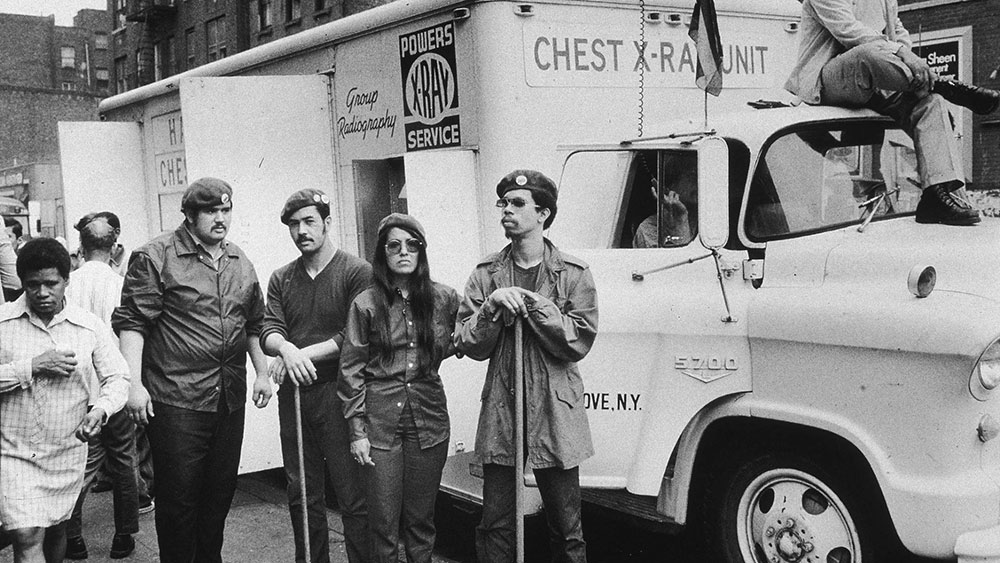Jenna Bliss’s half-archival, half-interview-based documentary charts the twists and turns of the 1970 occupation of the Bronx’s Lincoln Hospital by members of local activist and militant groups, including the Young Lords, the Black Panthers, and the Health Revolutionary Unity Movement (HRUM). Lincoln Hospital, known in the period’s local parlance as the “butcher shop,” was a tragically underfunded public hospital that had already been the site of several struggles for local autonomy and decolonized treatment modalities for the communities it was meant to serve. Bliss combines newsreel footage with contemporary interviews to tell the story of this important intervention in public health and milestone in addiction treatment.
HRUM had been formed in 1969 by workers of color from a number of the city’s public hospitals, such as Metropolitan (subject of Frederick Wiseman’s 1970 film Hospital), Gouverneur, and Lincoln, as well as from the Lower East Side’s NENA Health Center. They pressured their unions, 1199SEIU and DC 37, to fight against the structural racism within their own leadership and within the public healthcare system. At the time, heroin addiction was a public health crisis in the South Bronx community, but the dominant way of addressing it was profit-driven and widely seen as a cynical way to exploit a vulnerable population (Eli Lilly and Company was the leading manufacturer of methadone, which was pushed as the primary—and often only—treatment modality for opioid addiction). In the pithy words of Black Panther and healthcare reformer Michael Cetewayo Tabor: “Capitalism plus dope equals genocide.” The coalition orchestrating the occupation recognized that if the social and economic determinants of addiction were not addressed, the epidemic would continue unabated. To that end, they focused on making material changes to their patients’ lives, helping them move out of rat-infested apartments and litigating against slumlords.
Archival interviews with prominent Young Lords and Black Panther Party members, such as Juan González, Denise Oliver-Velez, and Cleo Silvers, shed light on the revolutionaries’ motivations when they orchestrated the takeover. Some of these remain achingly relevant, as structural racism and lack of economic opportunity continue to inexorably push people into addiction. On the other had, some of the movement’s principal voices now seem somewhat quaint, such as the radical acupuncturists who partly led it, including future Black Liberation Army member Mutulu Shakur and Walter Bosque, who helped develop the National Acupuncture Detoxification Association protocols for using the method to treat addiction. (Acupuncture is still a widely approved addiction treatment, but has many skeptics across the political spectrum.)
The People’s Detox incorporates archival footage from the Newsreel’s 1970 film Lincoln Hospital. Newsreel, an anonymous agit-prop filmmaking collective started in 1967, opens the film with some jarring statistics about northern New York City: the average income in the South Bronx (whose population is 30% black and 70% Puerto Rican) is half of that in Westchester (98% white), while the infant mortality rate is double. These disparities frame the ensuing exposé, which focuses on an earlier community-led intervention at the beleaguered healthcare facility. In 1963, Lincoln Hospital had been placed under the administrative aegis of the Albert Einstein College of Medicine and received a million-dollar federal grant to form the Lincoln Hospital Mental Health Services, a trailblazing community-based mental health treatment program staffed by social workers and mental health counselors from the community. However, the program received inadequate funding and wound up, in the words of one of its critics, as little more than “window dressing for Einstein’s liberal reputation.” As a result, a faction of the program’s non-professional staffers—mostly mental health counselors, orderlies, and custodial staff—orchestrated an occupation of the facilities in 1969.
One of their primary goals was to change the paradigm of mental health treatment at the center, which at the time was forced to rely heavily on pharmaceutical interventions. A holistic approach, today often referred to as integrated behavioral healthcare, is gaining momentum partly thanks to the trailblazing efforts of these activists. As an unattributed voiceover explains, “Health isn’t anything mysterious. It isn’t a drug company’s financial report, or research on the masses. It’s strong bodies, good minds, and people being treated as people.”
The People's Detox and Lincoln Hospital screen this evening, May 30, at Maysles Documentary Center as part of the series “Made in Harlem: The Lafargue Clinic Remixed.” Director Jenna Bliss will be in attendance for a Q&A alongside Dr. Barbara Zeller and Walter Bosque.



